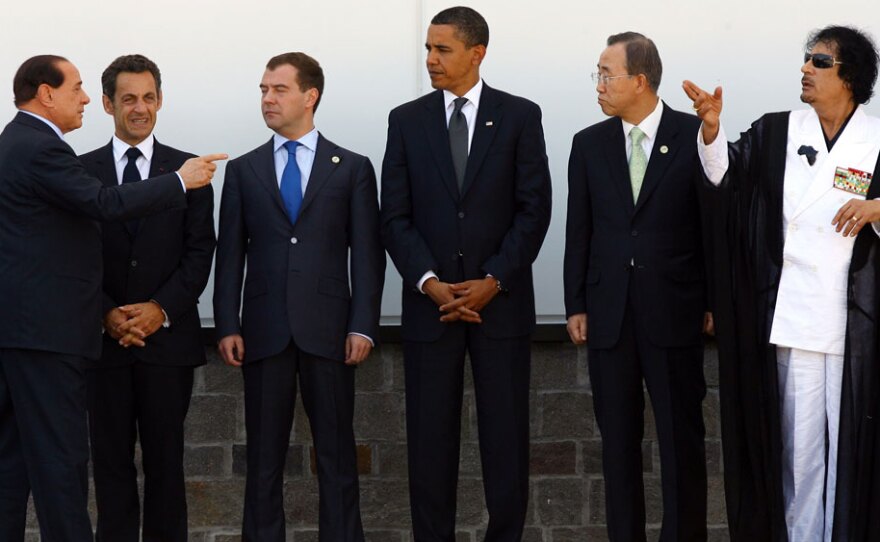President Obama was awarded the Nobel Peace Prize primarily for changing the tone of American policy, but real accomplishments are yet to come, foreign policy experts said Friday.
The Norwegian committee that awards the prize said that Obama had "captured the world's attention and given its people hope for a better future." Committee Chairman Thorbjoern Jagland acknowledged that the award was more for Obama's aspirations than for his achievements: "It was because we would like to support what he is trying to achieve."
Policy experts cite the Obama administration's initiatives in several key areas: nuclear nonproliferation and disarmament; the Mideast peace process, and his outreach to the Muslim world.
Jaglund specifically mentioned Obama's work on nuclear nonproliferation and disarmament. Joseph Cirincione, president of the Ploughshares Fund, said the president has made real gains in that area.
"In his speech in Prague in April, Obama articulated a vision of peace and security in a world without nuclear weapons, and by September, he'd won international support for that vision in a U.N. resolution," Cirincione noted.
Cirincione said Obama's job now is to "institutionalize these ideals within his own administration," where some officials have been resistant to them, and to counter what will be fierce opposition from conservatives in the Senate.
Obama hopes to win ratification of the Comprehensive Nuclear Test Ban Treaty in the Senate, but he faces fierce opposition from conservatives led by Sen. Jon Kyl (R-AZ), who has vowed to do everything in his power to see that it is defeated.
James Carafano, a senior fellow at the Heritage Foundation, said Obama's initiatives on nuclear issues are little more than "baby steps, so far." "We don't even have a full understanding of the administration's policies, yet," he said, "and no indication that they've had any impact in the past year."
Carafano said Obama's emphasis on reducing stockpiles of nuclear weapons in the U.S. and Russia isn't necessarily a sign of progress, because the danger is more widespread. "There may be fewer nukes in the world, but there are more people who have them," Carafano said.
Before making any commitments on reducing nuclear weapons, Kyl and other conservatives want an administration commitment to modernize the U.S. nuclear arsenal.
Carafano said the Nobel Prize is "a double-edged sword" that could actually make it more difficult for Obama's initiatives to succeed.
"It creates incredibly high expectations. If you're not wildly successful on arms control, you're going to look bad," and that, said Carafano, puts the administration at the mercy of its negotiating partners, such as the Russians, who have the power to say no.

Aaron David Miller of the Woodrow Wilson Center agreed that the prize isn't necessarily a boost for the administration's negotiating powers. "I think they're going to have to work around it, frankly," said Miller.
Obama has urged Israel to freeze all construction on settlements outside its pre-1967 borders. Israeli Prime Minister Benjamin Netayahu refused, especially in the case of a construction project in the traditionally Arab eastern portion of Jerusalem. Palestinians refused to resume talks without the freeze.
Both the Arabs and the Israelis have said they don't like the U.S. proposals, Miller noted. "Any time these tiny tribes say no to America without cost or consequence, it's not good."
Obama was unable to get either side to budge during a summit last month in New York and was only able to get them to agree to another round of "intense" talks, which is taking place now, with Mideast peace envoy George Mitchell shuttling between the two sides.
Daniel Serwer, vice president at the U.S. Institute of Peace, said he thinks the prize will burnish Obama's credentials among foreigners but won't do much in the eyes of the American public, which hasn't seen much yet in terms of American interests.
"I don't think people feel that the softening of tone has been productive yet," said Serwer, citing Obama's overtures to the Muslim world, which responded positively to the speech he gave in Cairo in June "but hasn't shown much in terms of support or change in behavior since then."
For their part, many Muslims see Obama's promise of "a new beginning" in the Cairo speech as unfulfilled. Walid Kazziha, a professor of political science at the American University in Cairo, told the AFP news service the prize was "like a payoff before the delivery. We haven't seen any concrete results."
Serwer said the American public may not feel much different. "My view is that the prize may tell us more about the Norwegians than about Obama," he said. "I think they cited him correctly for changing the tone, but the American public is more hard-nosed, and they haven't seen much yet in terms of results."
Copyright 2022 NPR. To see more, visit https://www.npr.org. 9(MDAzMjM2NDYzMDEyMzc1Njk5NjAxNzY3OQ001))






